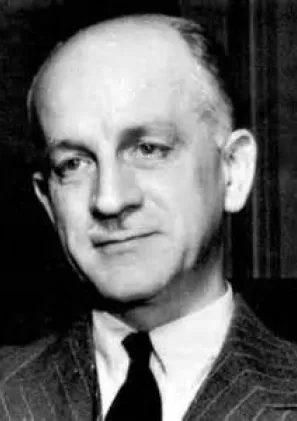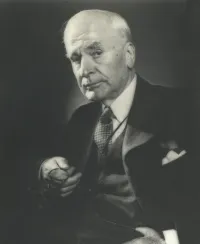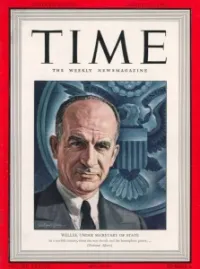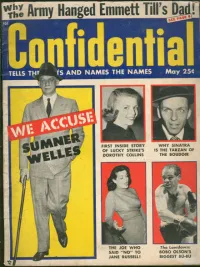Biography
1892 - 1961
"Can the peaceful, the stable, and the free world for which we hope be created if it is envisioned from the outset as half slave and half free?-if hundreds of millions of human beings are told that they are destined to remain indefinitely under alien subjection?"
- Benjamin Sumner Welles
Following the advice of family friend Franklin D. Roosevelt, Benjamin Sumner Welles took the Foreign Service examination in 1915 and entered the U.S. State Department's diplomatic corps. Welles used his relatively privileged birth, intelligence and dignified public presence to rise quickly through the ranks. His diplomatic work focused on Latin America and the Caribbean, where he was instrumental in developing Roosevelt’s “Good Neighbor” policy to improve relationships with Central and South American countries through cooperation and trade, not military force. He served briefly as US Ambassador to Cuba in 1933, but his public and controversial attempts to undermine the liberal regime there led to his ouster. In 1937, he was confirmed by the Senate to be the Undersecretary of State and became one of President Franklin D. Roosevelt’s most trusted diplomatic advisors. He co-wrote the Atlantic Charter in 1941 (alongside Roosevelt, U.K. Prime Minister Winston Churchill and British diplomat Alexander Cadogan) the cornerstone document in the formation of the United Nations, the dismantling of the British Empire, the formation of the North Atlantic Treaty Organization (NATO) and the creation of the General Agreement on Tariffs and Trade. Roosevelt also directed Welles to write the original UN Charter in the middle of World War II. At the onset of World War II, Welles was the natural choice to succeed ailing Secretary of State Cordell Hall, but suspicions that Welles was bisexual prompted an official investigation by FBI Director J. Edgar Hoover, which confirmed the rumors. Since LGBTQ people were deemed a security risk at that time, Roosevelt had no choice but to accept Welles' resignation. Excluded both formally and informally from the foreign policy establishment for the rest of his life, Welles resignation robbed the U.S. of its likely Secretary of State in the middle of World War II, underscoring the damage homophobia did to mid-century American foreign policy. Welles continued to write and publish commentary on international affairs, articulating his vision for a multilateral global community. He died in 1961 at the age of 68.
1892 - 1961
"Can the peaceful, the stable, and the free world for which we hope be created if it is envisioned from the outset as half slave and half free?-if hundreds of millions of human beings are told that they are destined to remain indefinitely under alien subjection?"
- Benjamin Sumner Welles
Following the advice of family friend Franklin D. Roosevelt, Benjamin Sumner Welles took the Foreign Service examination in 1915 and entered the U.S. State Department's diplomatic corps. Welles used his relatively privileged birth, intelligence and dignified public presence to rise quickly through the ranks. His diplomatic work focused on Latin America and the Caribbean, where he was instrumental in developing Roosevelt’s “Good Neighbor” policy to improve relationships with Central and South American countries through cooperation and trade, not military force. He served briefly as US Ambassador to Cuba in 1933, but his public and controversial attempts to undermine the liberal regime there led to his ouster. In 1937, he was confirmed by the Senate to be the Undersecretary of State and became one of President Franklin D. Roosevelt’s most trusted diplomatic advisors. He co-wrote the Atlantic Charter in 1941 (alongside Roosevelt, U.K. Prime Minister Winston Churchill and British diplomat Alexander Cadogan) the cornerstone document in the formation of the United Nations, the dismantling of the British Empire, the formation of the North Atlantic Treaty Organization (NATO) and the creation of the General Agreement on Tariffs and Trade. Roosevelt also directed Welles to write the original UN Charter in the middle of World War II. At the onset of World War II, Welles was the natural choice to succeed ailing Secretary of State Cordell Hall, but suspicions that Welles was bisexual prompted an official investigation by FBI Director J. Edgar Hoover, which confirmed the rumors. Since LGBTQ people were deemed a security risk at that time, Roosevelt had no choice but to accept Welles' resignation. Excluded both formally and informally from the foreign policy establishment for the rest of his life, Welles resignation robbed the U.S. of its likely Secretary of State in the middle of World War II, underscoring the damage homophobia did to mid-century American foreign policy. Welles continued to write and publish commentary on international affairs, articulating his vision for a multilateral global community. He died in 1961 at the age of 68.
Lesson Plan
Please login or register for an account to view this lesson plan.
Demography
Demography
Gender Male
Sexual Orientation Bisexual
Gender Identity Cisgender
Ethnicity Caucasian/White
Nations Affiliated Afghanistan United States
Era/Epoch Cold War (1945-1991) Great Depression (1929-1939) Progressive Era (1890-1920) Roaring Twenties (1920-1929) World War II (1939-1945)
Field(s) of Contribution
Civics, Government, Politics, & Law
Diplomacy
Social Sciences
US History
Commemorations & Honors
Welles' Papers Held at the National Archives at the Franklin D. Roosevelt Library in Hyde Park, New York
Welles Source of Winston Churchill's Famous "No comment" Phrase
Demography
Gender Male
Sexual Orientation Bisexual
Gender Identity Cisgender
Ethnicity Caucasian/White
Nations Affiliated Afghanistan United States
Era/Epoch Cold War (1945-1991) Great Depression (1929-1939) Progressive Era (1890-1920) Roaring Twenties (1920-1929) World War II (1939-1945)
Field(s) of Contribution
Civics, Government, Politics, & Law
Diplomacy
Social Sciences
US History
Commemorations & Honors
Welles' Papers Held at the National Archives at the Franklin D. Roosevelt Library in Hyde Park, New York
Welles Source of Winston Churchill's Famous "No comment" Phrase
Resources
Resources
Resources










